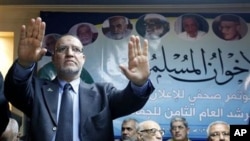Egyptian authorities this week have arrested some 70 members of the Muslim Brotherhood. The wave of detentions brings to more than 250 people belonging to the banned opposition group rounded up in the two weeks since it said it would take part in next month's parliamentary elections.
Security forces made the latest arrests in Alexandria, where Muslim Brotherhood members were putting up posters bearing the phrase "God is Great." It's hardly an unusual sentiment in this deeply religious nation, but the political overtones proved too potent for the government to ignore.
Egypt's constitution forbids religion-based parties, but the Brotherhood gets around the ban by fielding candidates as independents. Senior Brotherhood leader Essam el-Eryan is among those providing them support from a dusty, largely technology-free office in downtown Cairo.
"What is urgent and a priority is to change the principles and rules of the political game. We are ready to accommodate with any real political system," he said. "But now, we are not living in a political system. We are living in the state of police - a police state. It is not a state of politics."
|
Clothilde LeCoz, Reporters without Borders, Discusses Crackdown on Bloggers in the Middle East:
|
It's easy to see why the Brotherhood would hold that view, if only from the number of security agents outside their headquarters keeping track of all who enter.
Resigned to these facts, Eryan says the group is devoted to working for change peacefully and within the system.
Although the Brotherhood was founded in Egypt, and leaders such as the late Sayyid Qutb are among the heroes of militant Islam, the current Egyptian party renounced violence as a political tool in the 1970's.
A more recent sign of trying to create change from within is the Brotherhood's decision against an opposition-called boycott of next month's election.
But the group does reach out in other ways to competing anti-government forces.
"We spend a long time and many efforts to visit and to try to unite such political factions. Nevertheless the faraway ways between their ideologies and our ideology, we have common values and common demands and we have united before," he said. "But now they are afraid even from visiting us due to pressures from the security forces and the authorities."
The group is also pragmatic when it comes to women. Although credited, or blamed, depending on the perspective, for the conservative attitude toward women in Egypt, Eryan says female candidates will run for the newly allotted slots reserved for women parliamentarians.
And the group is uniquely situated in a country where the government has placed a growing number of curbs on public discourse.
Media publisher Hesham Kassem, who has faced harassment from authorities for his work, explains.
"They are probably the only organized force because secular and legitimate parties are not allowed access to the street," he said. "Once they start working there is harassment from the regime. But with the Brotherhood, they work through mosques and the regime cannot close down mosques. So they manage to get more traction and more work done more than any of the other parties."
That work includes educational, social and medical help to the nation's poor, filling yawning gaps left by the vast but often inefficient Egyptian bureaucracy.
Such charity has gone a long way to raise doubts about the way the government likes to portray the Brotherhood - radical extremists bent on destruction. The image is used both at home and abroad to justify some of the nation's more restrictive policies.
But publisher Kassem wonders, for all its persistence, how influential the Brotherhood really is.
"When you look at them organizationally, the Brotherhood do not exceed 100,000. In a country of 80 million, this is not really a grass roots movement," he said. "It's just the only movement that is allowed on the street. People seem to forget that the Brotherhood have been trying to get to power for almost 82 years now. It's not a very impressive C.V. as a political entity."
Frustration with the apparent lack of success is seen in increasingly outspoken younger members of the group, who have broken ranks in recent months over such issues as the boycott and other strategies.
Eryan takes the long view, noting that a succession of Egyptian leaders, including one-time ally and nationalist hero Gamal Abdel Nasser, have tried to keep the group down.
"We are not urgent. We are living. We are going to struggle more, sacrifice more, because we believe in such long life we accumulate points, maybe small points," he said. "But as a whole now, they cannot eradicate us. Nasser and Nasserism, and even Socialism and Communism, is something of history."
The Muslim Brotherhood leader says his group is not only in the present, "we are also in the future."




